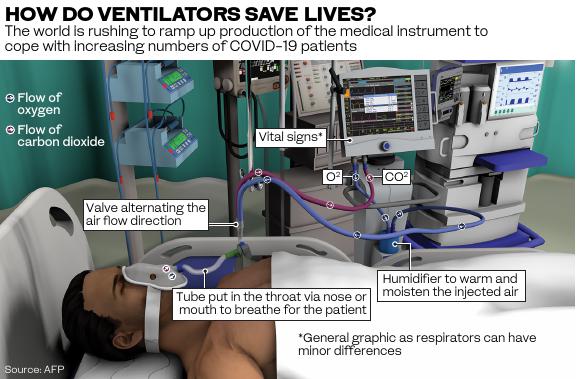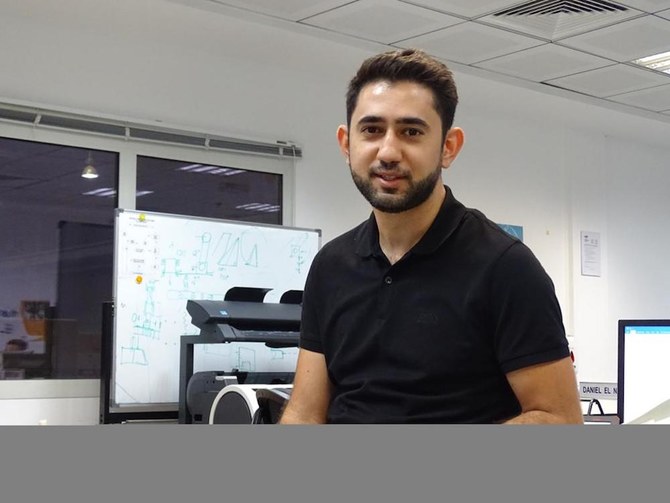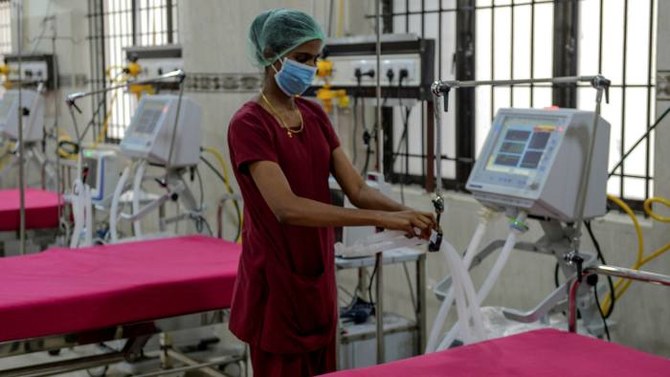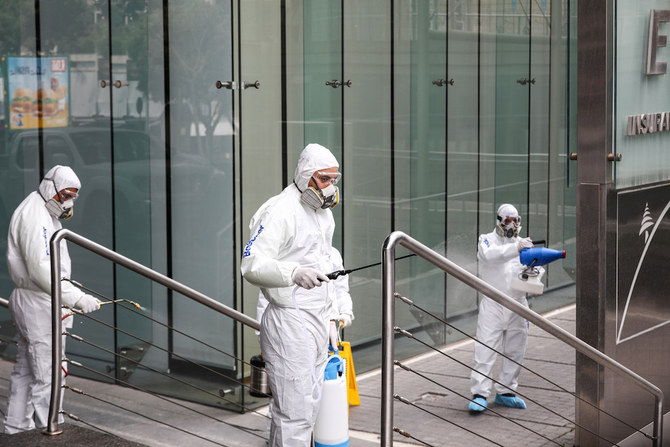DUBAI: As the coronavirus pandemic sweeps the world, many countries are finding themselves in dire need of a machine that until now was used to support the odd patient with severe respiratory conditions.
In the Middle East, the problem is especially acute given the region’s history of conflict, instability and weak governance.
Buying ventilators in large numbers (at a rate of $25,000 per unit) was never a priority for governments with long, pressing to-do lists.
But now, suddenly, across the Arab region people face a choice between waiting and watching, or doing something on their own before coronavirus cases overwhelm their country’s health system.
In Lebanon, several groups of people have taken the second option. Their objective is straightforward: To build a low-cost ventilator, a machine that mechanically assists a patient in the exchange of oxygen and carbon dioxide by a process of artificial respiration.
One of the initiatives is the brainchild of two alumni of the Lebanese University’s Faculty of Engineering, Hisham Issa and Hussein Hamdan, both engineers currently working abroad. Together with Dr. Hussein Al-Hajj Hassan, 30, they launched a Facebook drive to create an artificial ventilator entitled “A Breather for All Lebanon.”
“We might not be capable of serving everyone in hospitals, but there’s a possibility of manufacturing the machine here,” Hassan, who holds a Ph.D. in engineering from IMT Atlantique in France, told Arab News.
“So we conducted a study on the expertise we needed, whose results I posted on my Facebook page. The post went viral and people started calling me.”

To ensure its suitability for use by hospitals, the ventilator will be fabricated as per the specifications contained in a nine-page document issued by the UK’s Medicines and Healthcare Products Regulatory Agency (MHRA).
“We’re working to meet the MHRA specifications,” Hassan said. “We’re working in an incremental way, setting milestones and going forward toward each of them.”
According to the three engineers, although their ventilator is now in an advanced stage of development, they are struggling with the lack of availability of key components in Lebanon.
“If you want a perfect medical device, you need medical equipment, which isn’t available here, so we’re trying to find alternatives,” said Hassan.
Once the team has fabricated a successful prototype, ramping up production to meet the shortage of ventilators should not be a problem, he added. “What’s important is that the prototype meets all the requirements,” he said.
Hassan believes the Arab region is aware of the dangers of a shortage of ventilators at this time, pointing to countries such as Jordan, Palestine, Morocco, Algeria and others that have contacted him.

Employees of a private company spray sanitising liquid around a bank in a bid to limit the spread of the cornonavirus Covid-19, in the Lebanese capital Beirut. (AFP/File Photo)
“It’s nice to see that people are aware,” he said. “Lebanese people are skilled and full of energy. This, coupled with their determination, will enable them to achieve their goal.”
Another Lebanese innovator who is not counting on divine providence is Jad Berro, who said it became obvious to him about two weeks ago that the coronavirus pandemic was not going to spare Lebanon.
He began working in mid-March on a prototype of a basic automated bag valve mask.
“Lacking enough medical information at the time on mechanical ventilation, the general thought was that something simple could solve the imminent problem of ventilator shortage,” he told Arab News.
FASTFACT
800,000
Additional ventilators needed globally
“I make a living out of making products and prototypes, so we had a basic ventilator running (within a few days). This was a record by any standards.”
Elaborating on the contraption, Berro said: “The prototype can control the tidal volume, breaths per minute and the inhale-to-exhale ratio, with monitoring of excess pressure and internal self-tests to guarantee that the mechanism is functioning normally at all times.” But the functions are “very basic” and cannot be a replacement for a ventilator, he admits.
Berro said he halted production out of “ethical and moral concerns” as using it would have meant hooking patients to a device that had not been properly tested and did not offer any guarantee it would work for extended periods of time.
“What’s needed is a unified basic design that’s proven and tested, after which it might be possible to actually manufacture the machine,” he said.

Employees of a Lebanese public health company pose with their protective gear on in Beirut March 24, 2020. (AFP/File Photo)
“Numbers in Lebanon show that we have close to around 600 ventilators. The absolute worst-case surge requirement would be around 2,800. The crisis is global and the deficiencies are the same worldwide.”
It is estimated that worldwide, about 10 percent of patients with COVID-19 infection need ventilators.
Reports say about 880,000 more ventilators will be needed to deal with the demand caused by the global coronavirus pandemic.
Berro said efforts are being made to technologically enable one ventilator to service multiple patients of similar lung capacities.
“As global manufacturers are gearing up production of ventilators and medical devices, we can expect a slight relief,” he added.
FASTFACT
10%
Percentage of COVID-19 patients who need ventilators
“China seems to have successfully flattened the curve and might be able to send ventilators and medical supplies to other parts of the globe. A used ventilator is certainly better than a makeshift one.”
Another Lebanese ventilator prototype has been unveiled by MP Neemat Frem two weeks after he initiated a project in collaboration with a group of specialized engineers and doctors.
The machine, targeted for use in intensive care units (ICUs) in Lebanese hospitals, is being built to high specifications, incorporating the latest technological features developed by Phoenix Co., an affiliate of Lebanon’s INDEVCO Industrial Group.
“We decided to fight with all our means in Lebanon,” said Frem, who is also the group CEO. “We wouldn’t have accepted the prospect of dying without doing anything, so we decided to put in all our efforts and strength, and it’s starting to yield results.”
Clinical trials of the ventilators are estimated very soon, he said, adding that plans are simultaneously afoot to manufacture face masks.

“We still need some progress on the human-to-machine interface, which is the design,” he told Arab News.
“We’re fabricating the most complicated version of the ventilator — that is, the one used in ICUs.”
Phoenix Co.’s project had kicked off with a six-hour briefing by doctors, which was followed by the creation of a small taskforce comprising doctors, suppliers and biomedical engineers.
The challenge for Lebanon and other Arab countries, according to Frem, will be in purchasing material used to build ventilators in the needed quantities.
“I presume the coronavirus crisis will add stress on suppliers in Europe, the US and the Far East,” he said.
“So we’re now in sourcing mode — to locate what’s available, starting with our main suppliers.”
Frem feels Lebanon is not prepared for a sharp spike in COVID-19 cases, noting that at the current rate, “we’ll have big numbers in 50 days, which is worrying.”
Nevertheless, “it’s encouraging to see the fantastic work of startups and engineers,” he said. “We have to get rid of this ‘can’t do’ attitude in the Middle East once and for all. We’ll never surrender.”
Berro offered a similar take on the looming ventilator shortage amid the regional coronavirus crisis.
“Arabs survive on imports in times of prosperity as well as in times of crises,” he said. “This isn’t acceptable and needs to change.”




































